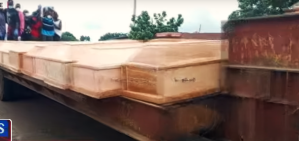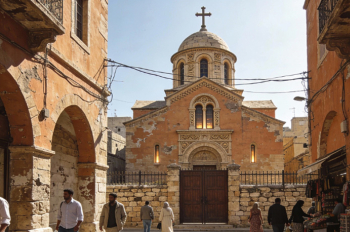
Residents in Plateau state, Nigeria on Friday (July 25) held a funeral procession for 27 Christians massacred in one village 10 days earlier despite warning authorities of the impending danger, sources said.
Accompanied by multitudes, they transported the 27 caskets in a pay-loader truck from a mortuary in Jos to their native Bindi (Jebbu) village, Riyom County, where they held a funeral following the unprovoked July 15 attack by Fulani herdsmen on the village.
The herdsmen attacked the predominantly Christian village at about 11 p.m. as residents slept.
“These are dead bodies of innocent Christians who were brutally and gruesomely murdered during their sleep by Muslim Fulani killer herdsmen and terrorists in a community situated less than 200 meters from the Special Task Force (STF), a military check point in Riyom Local Government Area,” rights activist James Nyango told Christian Daily International-Morning Star News. “The fact that this community noticed and reported the imminent attack to the STF military officers at that military checkpoint makes it more worrisome, suspicious and raises many questions.”
Rather than issuing verbal condemnations, he said, the government should prioritize prevention of herdsmen attacks and religious genocide against Christians.
Area rights advocate Gideon Manjal asserted that the attack was a herdsmen ploy aimed at displacing indigenous Christians from their lands.
“This attack occurred despite the visible presence of security forces in and around the area, including armored military assets,” Manja said. “The identities and hideouts of these attackers are known to authorities, yet no meaningful action has been taken to dismantle them.”
Pam Dachungyang, a senator in the National Assembly from the area, said the herdsmen went house to house killing the elderly, women and children as they were sleeping.
“The recurring attacks, including previous ones in Jol and Rim villages, point to a deliberate effort to terrorize and displace farming communities which are predominantly Christian communities by armed Fulani herdsmen,” Dachungyang said in a press statement. “This cycle of daily, unprovoked attacks is an indictment on security agencies. The situation in Bindi (Jebu) is beyond tragic and stands to be condemned by all.”
“These are people whose primary occupation is farming, and the continued violence is not only destroying lives but also threatening food security and livelihoods,” Dachungyang said.
Berom youth leader Dalyop Solomon noted that the Fulani herdsmen set several houses ablaze and that many Christians were wounded, along with the 27 slain.
Area residet Chollom Gyang said the corpses were taken from the morgue at the Jos University Teaching Hospital in Jos. He identified 26 of the Christians killed in Bindi village as Sarah Badung Bagit, Dorcas Badung Bagit, Nzen David Musa, Dusu Gyang Jok, Jere Pius Davou, Martha David Sunday, Esther David Sunday, Gorat David Sunday, Martha Solomon, Hudung Musa Dalyop, Hudaing Gyaus Fondong, Ruda Gyang Fondong, Patience Solomon Sunday, Patience Musa Dalyop, Danlami Tongs Davou, Tabitha Yakubu Shok, Magdalane Yakubu Shok, Patience Yakubu Shok, Bitrus Garba Danboyi, Nyou Tanko Ngyok, Monday Sunday Davou, John Tanko Ngyok, Darwang Tanko, Davou Bulus, Pam Dung and Esther Paul.
“Twenty-seven corpses of the Christian victims of the July 15 attacks of Jebu Bindi village of Riyom LGA by Fulani terrorists were transported home for mass burial today, 25 July,” Gyang confirmed.
Numbering in the millions across Nigeria and the Sahel, predominantly Muslim Fulani comprise hundreds of clans of many different lineages who do not hold extremist views, but some Fulani do adhere to radical Islamist ideology, the United Kingdom’s All-Party Parliamentary Group for International Freedom or Belief (APPG) noted in a 2020 report.
“They adopt a comparable strategy to Boko Haram and ISWAP and demonstrate a clear intent to target Christians and potent symbols of Christian identity,” the APPG report states.
Christian leaders in Nigeria have said they believe herdsmen attacks on Christian communities in Nigeria’s Middle Belt are inspired by their desire to forcefully take over Christians’ lands and impose Islam as desertification has made it difficult for them to sustain their herds.
Nigeria remained among the most dangerous places on earth for Christians, according to Open Doors’ 2025 World Watch List of the countries where it is most difficult to be a Christian. Of the 4,476 Christians killed for their faith worldwide during the reporting period, 3,100 (69 percent) were in Nigeria, according to the WWL.
“The measure of anti-Christian violence in the country is already at the maximum possible under World Watch List methodology,” the report stated.
In the country’s North-Central zone, where Christians are more common than they are in the North-East and North-West, Islamic extremist Fulani militia attack farming communities, killing many hundreds, Christians above all, according to the report. Jihadist groups such as Boko Haram and the splinter group Islamic State in West Africa Province (ISWAP), among others, are also active in the country’s northern states, where federal government control is scant and Christians and their communities continue to be the targets of raids, sexual violence, and roadblock killings, according to the report. Abductions for ransom have increased considerably in recent years.
The violence has spread to southern states, and a new jihadist terror group, Lakurawa, has emerged in the northwest, armed with advanced weaponry and a radical Islamist agenda, the WWL noted. Lakurawa is affiliated with the expansionist Al-Qaeda insurgency Jama’a Nusrat ul-Islam wa al-Muslimin, or JNIM, originating in Mali.
Nigeria ranked seventh on the 2025 WWL list of the 50 worst countries for Christians.






